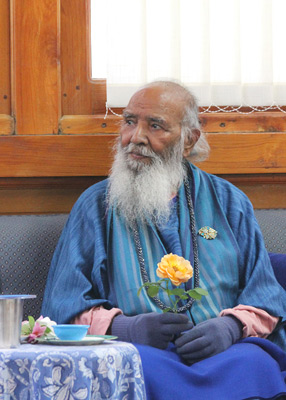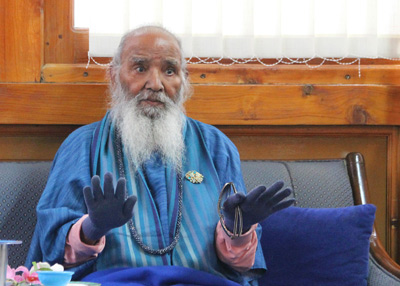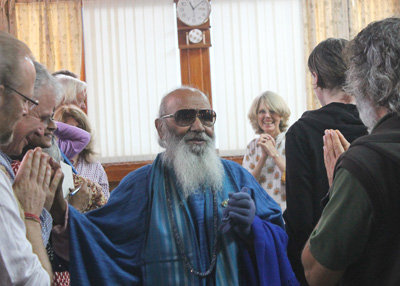Knowledge Is, Sukhendr Is Not
—Water Is, Bubble Is Not

Sukhendr: … Awareness alone exists, without regard to the form of knowing that it takes. I have said all that, and I have been living all that for the last week [since his last interaction with Swamiji]. Yet somehow something inside still always wants to adopt the pose of begging, pleading or supplicating, or the pose of the bhakta (devotee) to the Divine, going, "Please help!" I wonder about that which, even in the knowledge that I just described, wants to adopt the pose of beseeching. What is that? Why does that go on?
Swamiji: You have just described that somewhere, in everything, knowledge is there. Your intellect, mind, or you yourself as a person, knows that the intellect alone is, and the intellect is found to be in anything that you know. But you are not able to succeed in dropping the things, in dropping the objects. If knowledge alone is in everything, then things are not.
Sukhendr: Why can’t I succeed in dropping the things?
Swamiji: Because you still think that things are there, forms are there. This prevents it. Krishna says that we have two powers. He says, “Arjun, I have made two powers: one is a manifesting power, the second is an unmanifesting power.” The manifesting power is that Arjun is. The unmanifesting power is that he would like to see him dead. But Arjun says, “No, that you don’t do. I want to remain Arjun.” So you want to remain a person. You want to remain a form—knowing full well that you were not even born, let alone that your intellect or understanding was born.
Sukhendr: That desire to remain, what is that?
Swamiji: It is the desire, “I should not know.” When Krishn says, “Arjun, you should surrender the idea that form exists,” Arjun says, “I am surrendering, but I am maintaining myself.” Krishn is saying, “No. You are no more Arjun. We were never born. But I know this, that I am Unborn.” It is like in a dream. You see a dream. A dream is unhappening happening, unproduced produced, unobvious obvious. It is exactly the same in the waking state. But the waking state has been devised in such a way that the waking state should not be cancelled. The waking state power cannot be cancelled because of the intellect. And the intellect has never been. Unless you know that the ego-intellect-mind has never been, yet it is making you see that a snake is and there is no rope, it is not cancelled. These examples are being said hundreds of times, millions of times, in Vedant, in all the scriptures. They say, “God is. Man is. Self is. Knowledge is.” Your side is that knowledge is, so we leave all those examples. If knowledge is, then why is knowledge not when knowledge became Sukhendr?
Sukhendr: Knowledge is.
Swamiji: Knowledge is, Sukhendr is not. Water is, bubble is not. Water is, snowflakes are not. But you think that Sukhendr is, and knowledge is in Sukhendr.
Sukhendr: When you say that knowledge is that the ego-intellect-mind is not…
Swamiji: It means the body was not born. We are cancelling: the body was not born.
Sukhendr: Which is different than saying it is, in some sense, but it has no power over me.
 Swamiji: It is, because it is a kind of banana tree. You can peel one layer, one layer, one layer, one layer, one layer: it’s all space. But a human being, because of his eyes, sees form. And that you cannot easily cancel. So we say, “Meditate, and see whether you are succeeding in cancelling it or not.” When you meditate, there is no body on earth, not even your body. There is no mind. No intellect. Nothing—about which Amrit says, “Then, Aanand is Bliss. What to say of it?” That is Space. This Space all human beings cannot understand. If you remain among all those human beings and yet do the trip, then you are making a mistake. You are holding that knowledge has become, that fire has become a tree.
Swamiji: It is, because it is a kind of banana tree. You can peel one layer, one layer, one layer, one layer, one layer: it’s all space. But a human being, because of his eyes, sees form. And that you cannot easily cancel. So we say, “Meditate, and see whether you are succeeding in cancelling it or not.” When you meditate, there is no body on earth, not even your body. There is no mind. No intellect. Nothing—about which Amrit says, “Then, Aanand is Bliss. What to say of it?” That is Space. This Space all human beings cannot understand. If you remain among all those human beings and yet do the trip, then you are making a mistake. You are holding that knowledge has become, that fire has become a tree.
Sukhendr: When you say that I am holding…
Swamiji: Holding means that you are I, Sukhendr.
Sukhendr: But I is holding that.
Swamiji: Yes, I. So I is not there. This you don’t understand. Where is I?
Sukhendr: I have no idea.
Swamiji: No idea means that it is not.
Sukhendr: But it does its thing.
Swamiji: That’s why we say it is illusion. That’s why we say man cannot realize. When you, as a human being, sleep, when all human beings sleep, there is no intellect, no senses. And you know. You know there are no senses in deep sleep. Up to fifty years it has been going on that for twenty-five years of them, there is no mind, no intellect. Yet the very function of the waking state is not to accept I Pure, and to place this body on that I, or I on this body. You can understand this, perhaps you are understanding it, but you are not able to leave the idea that you are born. You are holding the idea, with your I, that “I am born. I am doing it. I am seeing it. I am hearing it. I have a desire and I have seen it, I have known it—and I’ll make it. And I will not die.” How impossible an idea you have!
Sukhendr: And to leave that idea?
Swamiji: You are realized.
Sukhendr: Now I’m back to your answer to my question from last week, which is that the power is here to leave that idea.
Swamiji: It is first. The second idea is not to accept it. So we say, “One without a second.” That is adwait. There is no janam (birth) and no maran (death). Birth and death do not exist. But watch: all human beings are living the life of birth and death. It is not their fault, we say, because we are made like that. What can animals do? You can’t give them teachings. Lucky we are that we are human beings and our mind, or brain, or knowing power, can know itself, that “I am the One.” No bones. How did bones come in the body? An intellectual will try to answer, saying, “It happened because we got phosphorus,” and this, and that and all those things. “It is because I’m born. Because my mother and father had their seeds.”
As she [Sukhada] said, the seed is burnt. The seed is burnt means ignorance is burnt. There are two powers: knowledge and ignorance. We speak of knowledge as, “You are knowledge.” And you say, “My ignorance is knowledge.” Ignorance is opposite, negative. It’s called viparya buddhi, the intellect is opposite—because you are a man and have been trained that you are born, you are living and you will die. Yet daily you see you are not the same person. Your childhood died, you cannot see it. It’s just like milk that became old. It was fresh, but where has the freshness gone? Now it’s curd. So you’re holding curd, which means you’re saying, “I’m curd.” You have never become curd. Curd was never born. Dahee (curd) is deh-hee (body, said with emphasis). [Laughter]
This is where you understand that knowledge is everywhere. In everything, knowledge is. When everything is knowledge, then where is “thing”? Knowledge is permeating, just as everywhere there is water in water’s outings. But we say, “No, no. Clouds are there, and the airplane cannot come. The sun cannot be seen, clouds are there.” That is where a human being is made like that. A human being is made so that he should die unhappy and disinterested in life. He has to die. At the time of death he says, “Well, look, whatever I had done, it appears I cannot take it with me. And I cannot eat properly. Only roti (bread), achar (pickle) and dal (lentils)”—because he can save some money on tomatoes. [Laughter] He has piled it up, and it could be spent on health.
 It’s a kind of joy. When you understand that a human being is made like that, if he’s made like that, then you have to change it. But the one who has to change is the same one who is made like that. That’s why he cannot change. He needs Guru, who tells him again and again, “Look, you have the power.” He means, “You are That.” It’s a very nice expression— “You have the power”—which is said so that you should be happy. But it’s not so. You don’t have the power, otherwise you could have removed it. [Laughter] It is removed. [He snaps his fingers] That is the only way. We will know it. We have known it. That’s why I say, “Now all of you have realized. What should I speak?” So I said, “Padma [it was her Amaram Light tea], you call some people to speak.” Because for me, everybody is realized. …
It’s a kind of joy. When you understand that a human being is made like that, if he’s made like that, then you have to change it. But the one who has to change is the same one who is made like that. That’s why he cannot change. He needs Guru, who tells him again and again, “Look, you have the power.” He means, “You are That.” It’s a very nice expression— “You have the power”—which is said so that you should be happy. But it’s not so. You don’t have the power, otherwise you could have removed it. [Laughter] It is removed. [He snaps his fingers] That is the only way. We will know it. We have known it. That’s why I say, “Now all of you have realized. What should I speak?” So I said, “Padma [it was her Amaram Light tea], you call some people to speak.” Because for me, everybody is realized. …
Ahankar (sense of individuality). That ahankar you have to give up. That’s all. Ahankar means ego-intellect-mind. As long as you think you are ego-intellect-mind, a big person, you remain as sukh-dukh (joy-pain), rag (attachment) and dwesh (aversion). Sukh and dukh means rag and dwesh. And that’s what the human mind is. We have to come to know that it is maya (illusion). Maya is that you should know that it’s not maya, rather it’s very good. Maya again and again says, “You are most wonderful today.” [Laughter] “Certainly, tomorrow, I’ll have that”… [which I desire.] This is where you have yourself accepted and come to know you could not find where I is. So your idea of I is incorrect. If your idea of I were correct, you should have found it.
Sukhendr: Is there a correct idea of I?
Swamiji: The idea of I that you are holding is that “I am somebody.” And you were never there when you were not born as somebody. That past, your originality, is forgotten, and this non-originality came and became original. So Sat has been left, asat has come. Sat means unchanging, asat means changing. They are words. We use them, but we should use them so much that we can know it. Without knowing we use them, saying, “I’m born and I’ll die.” “I’ll die” you say less. It’s me who says it again and again. Death has not been recorded in your system. You say [imitating, in a frightened voice], “Don’t talk about death!”—as if death were not there. Then I came to know, “They love that death is not there,” so I say, “Well, look, death is not there.” But if you are born, then you die.
The main thing is this. You have to know what you do early in the morning. As soon as you wake up, you are a person. And you seek knowledge. Why? Only early in the morning you become aware that you are ignorant. You were alright in sleep. In sleep there is no necessity for anybody to ask for knowledge. The moment you became awake, immediately you thought, “I’m knowledge, actually. So what happened to me? I’m not this fire. I was sheetal—very calm, cool, collected and sleeping well. There was no worry, no tension, no agitation, no awareness. But now, in the waking state, I’m wondering, Where is my bed?” Immediately. Bed and body. That’s why its name is bed: it’s very bad. [Laughter] But you say, “No, it is very good, because I sleep on it.” So you should remain like this. You should not dare to change. [Laughter] He knows that. He’s just pleasing Padma, that’s all. Thank you.
Copyright © 1999-2013 International
Meditation Institute. All Rights Reserved